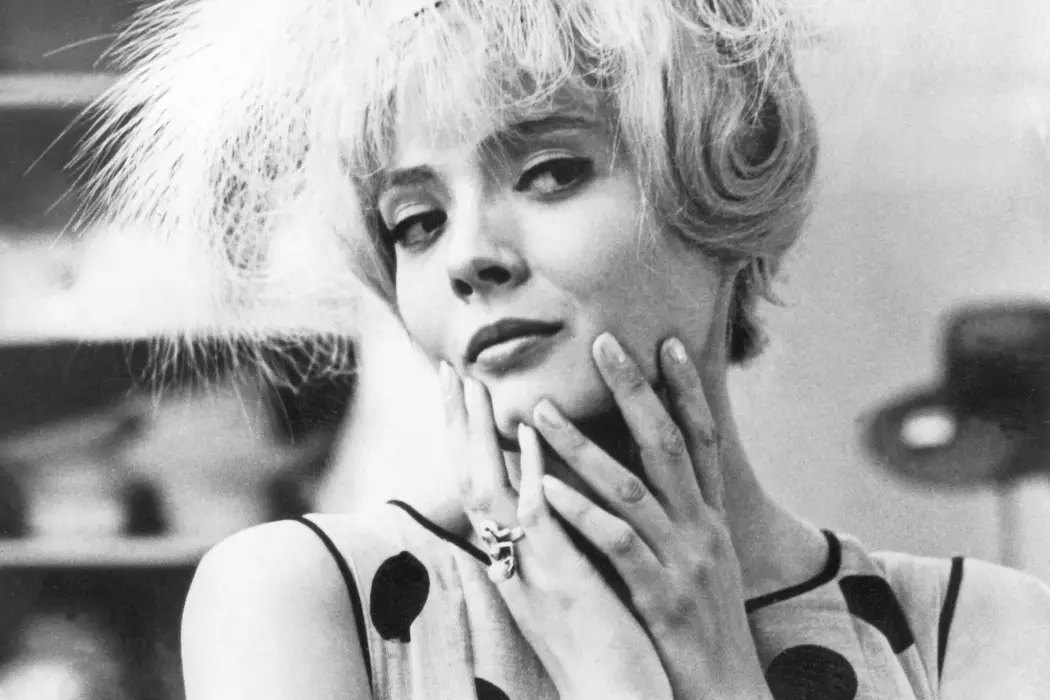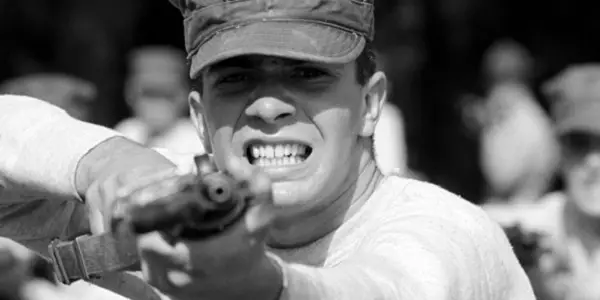EARLY SHORT FILMS OF THE FRENCH NEW WAVE: Exploring Icarus Films’ New Anthology

Lee Jutton has directed short films starring a killer toaster,…
Godard before Breathless. Varda before Cléo from 5 to 7. Resnais before Hiroshima mon amour. It’s hard to imagine these iconic filmmakers of the French New Wave as anything less than the legends they are remembered as today, yet once upon a time, they were just a group of young creatives trying to break free from the strictures of what Truffaut dubbed “French quality” and reinvent the art of cinematic storytelling.
Producer Pierre Braunberger agreed, stating, “Cinema already has a dated, old-fashioned technique. It is through a bold systematic appeal to young people that it will be able to move forward again.” That’s why Braunberger signed the “Group of 30” manifesto, which defended the short film as a key medium for cinematic experimentation that, as Braunberger put it, “could never be envisaged with a major film.”
“Who knows what tomorrow will surely testify to our civilization?”
With the help of government subsidies and commissions, Braunberger went on to produce numerous short films involving many of the artists who would go on to become luminaries of the French New Wave. A new box set from Icarus Films collects some of the most extraordinary and influential of these shorts, all produced by Braunberger in the decade between the mid-1950s and mid-1960s and all presented in brand new 2K restorations. Early Short Films of the French New Wave essentially constitutes a mini crash course in cinematic style, from Alain Resnais’ modernist documentary shorts to Jean Rouch’s cinema-verite portraits of society to Jean-Luc Godard’s embittered battles of the sexes.

One of the major highlights of the collection, for me, is actually the first film included on the first disc in this two-disc set. All the World’s Memory takes the audience on a tour of the National Library of France, yet because our guide is Alain Resnais, this is no ordinary stroll through the stacks. “Because man’s memory is short, he accumulates numerous reminders,” the narrator (Jacques Dumesnil) intones, before taking us down a mesmerizing rabbit hole filled with shelves upon shelves of these reminders. Over the course of 21 minutes, the film explores the incredible architecture of the institution; the camera emphasizes the sharp lines and almost kaleidoscopic layout of the shelves, rendering the concrete almost abstract in the way aspects of the interior are framed. We also follow a newly published book on the road from initial intake to its not-so-final resting place on a shelf, where it will be taken and returned again and again over the course of its lifetime.
All the World’s Memory is a fascinating look at not just the overall importance of libraries in our culture but also the nitty-gritty of the various processes that keep such institutions running. Whether or not you’re a fan of Resnais’ almost aggressively modernist features—goodness knows Last Year at Marienbad, while a masterpiece, is not for everyone—it’s intriguing to see those same storytelling techniques applied to the form of the short documentary. And Resnais is not the only member of the crew who would go on to even greater things: composer Maurice Jarre won three Oscars for his work with David Lean, while cinematographer Ghislain Cloquet shot Resnais’ landmark Holocaust documentary Night and Fog as well as classics by Jacques Demy (The Young Girls of Rochefort, Donkey Skin) and Robert Bresson (Mouchette, Au Hasard Balthasar).
“Are you happy?” “No, but I don’t have time to be unhappy.”
All the World’s Memory is not the only Resnais short included in Early Short Films of the French New Wave; The Song of Styrene, commissioned by French industrial group Pechiney to promote the advantages of plastics, is vivid, colorful, and informative, though it lacks emotional resonance. Still, there are many other exciting experiments in documentary filmmaking included in the set, which is arranged in such a way that non-fiction and fiction tend to alternate, allowing the audience to see how similar artistic techniques—liberal use of voiceover, shrewd social and political commentary, abstract imagery that nonetheless elicits a powerful emotional response—are applied across genres.

Other standouts among the films included in Early Short Films of the French New Wave are Agnes Varda’s Ô saisons, ô châteaux, a delightful short documentary commissioned by the French Tourist Bureau that is full of color, whimsy, and magical realism; Jean-Luc Godard’s All the Boys Are Called Patrick, a clever little comedy written by Eric Rohmer in which an obnoxious pick-up artist (French New Wave icon Jean-Claude Brialy) attempts to seduce two young women who happen to be roommates; Melvin Van Peebles’ 500 Francs, a silent film with an entirely non-diegetic soundtrack (including a music score by Van Peebles) that follows the misadventures of a young boy attempting to retrieve a 500-franc note from the bowels of a sewer grate; and Jean Rouch’s The Fifteen-Year-Old Widows, a painful documentary examination of teenage life in the mid-1960s that doubles as a critique of post-war bourgeois superficiality. At one point, a girl tells her friend about the time she ended up alone with four boys at a party and they all wanted to sleep with her. “Did you enjoy it?” her friend asks. “No,” she says bluntly, and the conversation abruptly ends. Later, that same girl tells a photographer that she doesn’t really enjoy having sex all the time; she just does it because it is what is expected of her. When she’s 25, she’ll settle down, get married, and that will be the end of that.
One of the most compelling (and, in my view, essential) films in the set is the original director’s cut of Francois Reichenbach’s The Marines, which follows a group of new recruits on Parris Island in South Carolina as they go through the motions of being transformed from “young boys who don’t know what to do with their bodies or souls” into anonymous soldiers ready to serve. Reichenbach shot The Marines around the time that six recruits tragically drowned during a night-time forced march after a rainstorm; as a result, his original version of the film carries an extremely anti-militarist bent, which the U.S. military sought to repress.

Both the voiceover narration and the imagery in The Marines focus on how the military attempts to erase all vestiges of individuality from their recruits in order to turn them into killing machines. Reichenbach shows us young men lining up to have their bodies inspected and their heads shaved, caps aggressively pulled down over their eyes so you can’t see their faces or distinguish one young man from the other. In drills, they twist their faces into grimaces and repeatedly utter animalistic growls, over and over, as they jab their bayonets into the empty air. Eventually, they all start to blend together into a mass of something that doesn’t seem entirely human. “Is it possible to build men without abasing their individuality?” the narration asks, leaving us to ponder the answers in the lingering silence that follows. It’s a masterful, critical examination of one of the most powerful institutions in the world, and it’s wonderful that Icarus Films is making it available to audiences in its original form.
Conclusion:
Early Short Films of the French New Wave also includes a fascinating bonus film featuring and directed by Braunberger‘s wife, Gisèle Braunberger, in which she workshops a scene with Jean Renoir; anyone who has ever directed actors or wanted to direct them will find observing Renoir‘s technique to be invaluable. Throw in an informative booklet with an essay by Eric Le Roy and Early Short Films of the French New Wave is truly a must-own for any fan-slash-scholar of the era.
Early Short Films of the French New Wave is available on DVD and Blu-ray from Icarus Films on September 19, 2023.
Does content like this matter to you?
Become a Member and support film journalism. Unlock access to all of Film Inquiry`s great articles. Join a community of like-minded readers who are passionate about cinema - get access to our private members Network, give back to independent filmmakers, and more.
Lee Jutton has directed short films starring a killer toaster, a killer Christmas tree, and a not-killer leopard. Her writing has appeared in publications such as Film School Rejects, Bitch: A Feminist Response to Pop Culture, Bitch Flicks, TV Fanatic, and Just Press Play. When not watching, making, or writing about films, she can usually be found on Twitter obsessing over soccer, BTS, and her cat.













